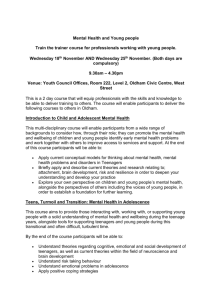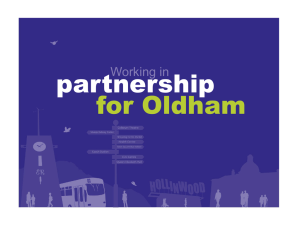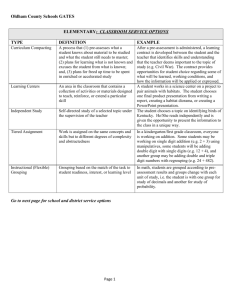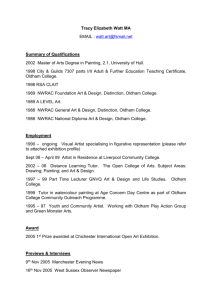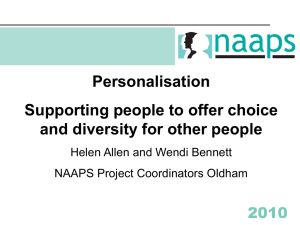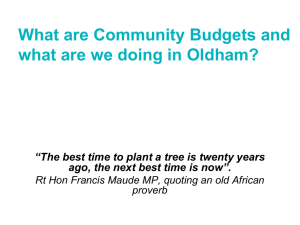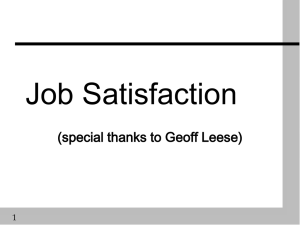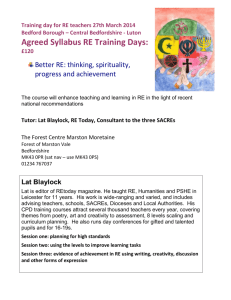Experiences and Opportunities for RE in EYFS
advertisement
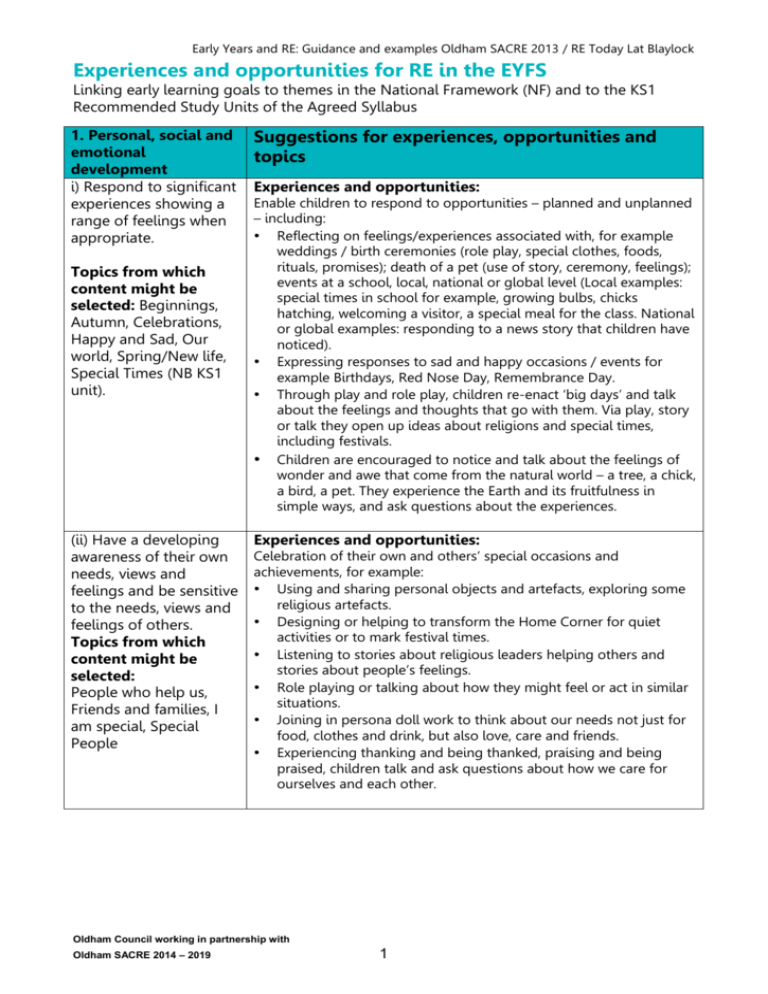
Early Years and RE: Guidance and examples Oldham SACRE 2013 / RE Today Lat Blaylock Experiences and opportunities for RE in the EYFS Linking early learning goals to themes in the National Framework (NF) and to the KS1 Recommended Study Units of the Agreed Syllabus 1. Personal, social and emotional development i) Respond to significant experiences showing a range of feelings when appropriate. Topics from which content might be selected: Beginnings, Autumn, Celebrations, Happy and Sad, Our world, Spring/New life, Special Times (NB KS1 unit). (ii) Have a developing awareness of their own needs, views and feelings and be sensitive to the needs, views and feelings of others. Topics from which content might be selected: People who help us, Friends and families, I am special, Special People Suggestions for experiences, opportunities and topics Experiences and opportunities: Enable children to respond to opportunities – planned and unplanned – including: • Reflecting on feelings/experiences associated with, for example weddings / birth ceremonies (role play, special clothes, foods, rituals, promises); death of a pet (use of story, ceremony, feelings); events at a school, local, national or global level (Local examples: special times in school for example, growing bulbs, chicks hatching, welcoming a visitor, a special meal for the class. National or global examples: responding to a news story that children have noticed). • Expressing responses to sad and happy occasions / events for example Birthdays, Red Nose Day, Remembrance Day. • Through play and role play, children re-enact ‘big days’ and talk about the feelings and thoughts that go with them. Via play, story or talk they open up ideas about religions and special times, including festivals. • Children are encouraged to notice and talk about the feelings of wonder and awe that come from the natural world – a tree, a chick, a bird, a pet. They experience the Earth and its fruitfulness in simple ways, and ask questions about the experiences. Experiences and opportunities: Celebration of their own and others’ special occasions and achievements, for example: • Using and sharing personal objects and artefacts, exploring some religious artefacts. • Designing or helping to transform the Home Corner for quiet activities or to mark festival times. • Listening to stories about religious leaders helping others and stories about people’s feelings. • Role playing or talking about how they might feel or act in similar situations. • Joining in persona doll work to think about our needs not just for food, clothes and drink, but also love, care and friends. • Experiencing thanking and being thanked, praising and being praised, children talk and ask questions about how we care for ourselves and each other. Oldham Council working in partnership with Oldham SACRE 2014 – 2019 1 Early Years and RE: Guidance and examples Oldham SACRE 2013 / RE Today Lat Blaylock 1. Personal, social and emotional development (iii) have a developing respect for their own cultures and beliefs and those of other people Topics from which content might be selected: Our Community, Celebrations, Our special times. (iv) understand what is right, what is wrong and why; consider the consequences of their words and actions for themselves and others. Topics from which content might be selected: Friends, Special people, Special Books, (NB KS1 units), Our rules. Right and wrong. (v) understand that people have different needs, views, cultures and beliefs that need to be treated with respect. Understand that they can expect others to treat their needs, views, cultures and beliefs with respect. Topics from which content might be selected: Our community, Special Times Our class, Our World. Suggestions for experiences, opportunities and topics Experiences and opportunities: Recognise, for themselves and others, the importance of some stories, customs, actions associated with religious and cultural occasions, for example: • Talking confidently about their own family customs and practices – from eating meals and visiting each other to religious celebrations or life cycle rituals. • Recognising leaders, including religious visitors, knowing how to behave and talk to them respectfully. • Showing respect for beliefs by handling artefacts with care. • Listening sensitively to the experiences of visitors from community and their peers. • Playing/working carefully in the Home Corner. • Watching and talking about video which features festivals and special times: children think about themselves and ask questions: how am I special? How are other people different? Why is it good to be different? What does it mean to belong? Experiences and opportunities: Identify and reflect on teaching about right and wrong and how it relates to their own behaviour: • Thinking and talking about stories that teach the importance of kindness and friendship. • Joining in persona doll work where naughty actions are explored: how does it make people unhappy? • Role playing situations and talking about different outcomes which are right and wrong, listening to some rules for living and some stories about important religious leaders/teachers with reference to sacred texts. Experiences and opportunities Identify and share what matters to them and others, including those with religious commitment, by: • Talking about similarities and differences in lifestyle, religious and cultural practices, dress, food, music and their own and their peers’ everyday lives. • Visiting places of worship in the local community and talking to the people for whom these are important. • Looking at books / television programmes which show difference and be encouraged to see these in a positive light, using the language of kindness and respect simply. • Making displays of their own or class’ special objects and play at / talk about how to keep them special. • Dressing up to mark special occasions like birthdays, birth of baby. Choosing special clothes for different occasions and moods; me – how am I special? Oldham Council working in partnership with Oldham SACRE 2014 – 2019 2 Early Years and RE: Guidance and examples Oldham SACRE 2013 / RE Today Lat Blaylock Early learning goals: 2 Communication+ language Listen with enjoyment and respond to stories, songs and other music, rhymes and poems and make up their own stories. Topics from which content might be selected Christmas, Passover, Divali, Holi, Eid, Special people, Heroes, Friends, Our Families Suggestions for experiences, opportunities and topics Extend their vocabulary and explore the meaning and sounds of words. Topics from which content might be selected All Experiences and opportunities Use language to imagine and create roles and experiences. Story Celebration Belonging Topics from which content might be selected: Christmas story, Noah, festivals, for example Hanukkah, Purim. Use talk to organise, sequence and clarify thinking, ideas, feelings and events. Experiences and opportunities Experiences and opportunities Hear religious and spiritual stories and songs which: (i) feature in festivals (see topics below) (ii) contain elements of teaching, example or guidance. These could be stories told by or about Jesus or other religious leaders, such as the Buddha, Moses, Prophet Muhammad, Guru Nanak; (iii) relate to family and friends and / or address core issues of human feelings, emotions and experiences. Respond to stories by: • Talking about the good and bad people/events/feelings in the story. • Asking questions about the puzzling elements of stories. • Listening to music or poems about special times and responding creatively, for example through dance or making up their own poems/stories. • Hearing stories and songs about religious special times. • Sharing stories and play activities arising from them which make us think about rhymes, poems, mimes and rhythms (there are lots of religious stories told in these kinds of ways). • • • Across a range of topics, learn and begin to use new vocabulary associated with RE, including places of worship, special ceremonies, people’s words to describe their ideas about God, special times and celebrations and so on. Words could include: pray, Christian, Jew, Muslim, holy, church, vicar, minister, Imam, Rabbi, holy book, Bible, Torah, Qur’an, special day, festival, celebration, Easter, Pesach, Eid al Fitr. Learning particular items of vocabulary need never be an aim in EYFS RE, but it is a main route for pupils to become familiar with the worlds of religions. They name things, and learn about them from the names. This is good work in any subject, including RE. Respond to opportunities for talk and role play, for example: festivals, activities in the Home Corner and school events such as assemblies. • Using puppets, play mobile people or Lego figures to retell a Biblical story such as Noah, or stories from other traditions. • Talking about, planning and participating in plays such as nativity plays; Purim plays (Jewish). • Role playing characters from stories, using Home Corner for practising. • Joining in stories and asking questions to a persona doll about the experience of praying, celebrating or going to a holy building. Experiences and opportunities Talk about the characters and events in festival stories, other stories from religious traditions and other stories that convey meaning, for example stories about bravery, loyalty, friendship, loneliness. Encourage children to ask questions about the characters and their actions as well as “What if Oldham Council working in partnership with Oldham SACRE 2014 – 2019 3 Early Years and RE: Guidance and examples Oldham SACRE 2013 / RE Today Lat Blaylock Retell narratives in the correct sequence, drawing on language patterns of stories. Believing Myself Story Topics from which content might be selected: Christmas, Passover, Holi, Divali Our favourite stories. …?” questions. Extend language by: • Looking at a Bible or Children’s Bible or Haggadah or text from another faith and compare different styles and presentation and think about how special books are looked after. • Choosing words from a bank that describe a person, a feature of religion or a character in a story. • Talking about how characters might be feeling at different points in the story. • Talking about how things might have turned out differently • Re-ordering simple picture sequences of narratives. • Adding speech bubbles to drawn characters, or suggesting what people might say or think. Oldham Council working in partnership with Oldham SACRE 2014 – 2019 4 Early Years and RE: Guidance and examples Oldham SACRE 2013 / RE Today Lat Blaylock Early learning goals: 3. Understanding the world Suggestions for experiences, opportunities and topics Investigate objects and materials by using all their senses as appropriate; Experiences and opportunities Find out about and identify some living things, objects and events they observe. Look closely at similarities, differences, patterns and change Believing Symbols Celebrations Topics from which content might be selected: Celebrations, Our town (village); Old and new, Buildings. Use ICT to support their learning. Topics: All Use and develop the potential for local study of places of worship or aspects of cultural diversity by: • Visiting and observing the interiors and exteriors of buildings used for worship. • Identifying different features, comparing old and modern and talking about preferences. • Listening to sounds, music, voices and instruments, and listen in silence to their own thoughts. • Smelling incense, the cooking of different celebratory foods, the scent of flowers used in worship in some settings. • Touching old stonework or graves, glass work, other features – and learning that sometimes we ‘do not touch’. • Investigating artefacts using the sense of touch through a “feely bag” approach. • Handling religious artefacts in the classroom or making simple equivalents their own. • Tasting food associated with different religious festivals and cultures. • Dressing up in range of cultural costume, for example a wedding sari, a Vicar’s robes, the costumes for a nativity play, the head coverings some people wear to pray. Times – why do religions have special times? Experiences and opportunities Use the wealth of video, CD-ROM, internet and other ICT equipment available, including interactive whiteboards, to support exploration of a range of religious and spiritual topics by: • Finding out about the lives of children in a range of faith communities and noting things that are the same and different. • Examining closely the people, clothing and objects used at special times in religion (interactive white board). • Listen to recordings of songs used in worship or calls to prayer. • Use digital cameras to record objects / features of special interest in a place of worship. Oldham Council working in partnership with Oldham SACRE 2014 – 2019 5 Early Years and RE: Guidance and examples Oldham SACRE 2013 / RE Today Lat Blaylock Early learning goals: 3. Understanding the world Suggestions for experiences, opportunities and topics Ask questions about why things happen and how things work Find out about past and present events in their own lives, and in those of their families and other people who they know. Believing Belonging Experiences and opportunities Topics from which content might be selected: Special Times; Weddings; Babies/ New Life. Find out about their environment and talk about those features they like and dislike. Story Belonging Celebrations Topics from which content might be selected: Beginnings; Our world; Seasons; Our favourite places Gain awareness of special events and times in people’s lives by: • Talking to family members, visitors and other adults in school about important times they remember from long ago or times that are important to them now, including special religious occasions. • Asking people about their feelings and reasons for these events being important. • Looking carefully at photographs and the expressions and body language of people: acting out examples of positive body language such as greetings, farewell gestures, positions for praying. • Comparing the experiences of the people they question with photographs, pictures in books, etc, which show other people involved in similar events for example christening and other birth ceremonies, weddings. • Handling objects (where appropriate) such as souvenirs, gifts given on religious occasions, some religious artefacts. Experiences and opportunities Provide opportunities to explore and respond to the natural world through: • Exploring the school grounds and locality and identifying things of beauty as well as things that have been spoiled by people. • Talking about the good and bad ways of treating the world. • Engaging in some practical work such as a nature table or a project to clear up rubbish. • Listening to stories from religions which show that some people believe God made the world. • Listening to stories or poetry which express awe and wonder at the natural world. • Reflecting on the things which make them sad about the world, for example natural disasters and the effects on people, poor people in the world who have no food. • Responding through creative work for example art, dance, collage, simple poetry. • Learning the value of silence and reflecting in a “stilling exercise”. • Observing the seasonal changes in nature by photographing or drawing. Oldham Council working in partnership with Oldham SACRE 2014 – 2019 6 Early Years and RE: Guidance and examples Oldham SACRE 2013 / RE Today Lat Blaylock Early learning goals: 3. Understanding the world Suggestions for experiences, opportunities and topics Begin to know about their own cultures and beliefs and those of other people. Believing Story Symbol Leaders and teachers Topics from which content might be selected: Special Times, Special Places, Special People, Who was Jesus? Celebrations; Festivals; The Church / Synagogue / Mosque. Experiences and opportunities Explore stories, festivals and visiting places of worship to build up a basic recognition that religion plays an important part in the lives of many people. Experiences such as: • Finding out about aspects of important occasions in people’s lives like weddings or birth naming ceremonies and using these times as a basis for thinking about promises made, special clothing and objects used and their meaning; special foods and gifts, holy words. • Hearing stories associated with important religious leaders from the past and thinking about the meaning in these stories. • Asking questions of visitors from local faith communities about their role or why their place of worship matters. • Examining a range of artefacts, asking questions and looking for answers. • The Earth – what do religions teach us about keeping the earth and its people special? • Using a wide range of sensory learning, touch, taste, smell, feel and hearing, as they investigate the above. Oldham Council working in partnership with Oldham SACRE 2014 – 2019 7 Early Years and RE: Guidance and examples Oldham SACRE 2013 / RE Today Lat Blaylock Early Learning Goals 4: Expressive Arts and Design Suggestions for experiences, opportunities and topics Use their imagination in art and design, music, dance, imaginative play, role play and stories. Experiences and opportunities Express and communicate their ideas, thoughts and feelings, using a widening range of methods. Respond in a variety of ways to what they see, hear, smell, touch and feel. Believing Story Symbols This area provides major opportunities for: • Expressing feelings in dance of joy, sadness, etc, when responding to themes from stories. • Responding in dance to religious music which is joyful and lively or reflective and prayerful. • Modelling places of worship or making their own artefacts such as divas. • Listening to a range of religious / cultural music or observing dance, for example Hindu dance and hand gestures, Jewish music for joyful or sad occasions, Christian movement and action songs. • Sharing in times of quiet reflection and stilling exercises for example, using candles. • Making harvest boxes or decorated sweet boxes for Divali or Eid festivals. • Telling festival or other faith stories through dance / mime. • Making collages to depict seasons or stories such as Noah or Jonah or Rama and Sita. • Looking at different works of art, for example images of Jesus; • Describing their reactions to smells for example incense or special foods, for example latkes. • Making foods for special festival times. • Talking about the way different colours make them feel, linking colours to emotion (for example choosing a colour for feeling angry, calm, sleepy, wide awake, happy or sad). Oldham Council working in partnership with Oldham SACRE 2014 – 2019 8

